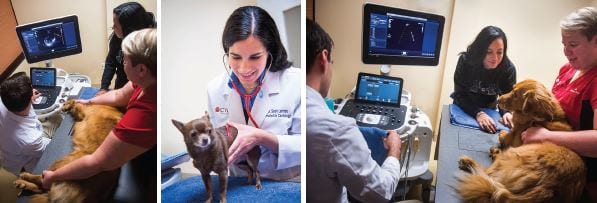What Vets Look For During an Ultrasound For Dogs Exam}
Wiki Article
Checking Out the Vital Services Offered by a Vet Cardiologist: Recognizing Ultrasound and CT Check Techniques
Veterinary cardiologists play an essential duty in the health and wellness of animals by diagnosing and dealing with various heart problems. They use sophisticated imaging techniques, such as heart ultrasound and CT scans, to offer accurate analyses. Each technique has its distinct benefits and applications. Comprehending these techniques is essential for family pet owners looking for the very best care for their companions. What aspects should animal proprietors think about when choosing in between these diagnostic devices?
The Function of Vet Cardiologists in Family Pet Medical Care
Vet cardiologists play a vital role in the healthcare of pets, focusing specifically on diagnosing and treating heart-related conditions. They possess specialized training that allows them to interpret complex diagnostic examinations and recognize numerous cardio concerns. These specialists make use of sophisticated methods, such as echocardiography and electrocardiography, to examine heart function and structure accurately.Veterinary cardiologists also develop customized therapy strategies that may include medications, lifestyle alterations, and, in many cases, medical interventions. Their know-how prolongs to informing pet dog proprietors regarding heart wellness, stressing the relevance of routine examinations and early discovery of possible issues. Collaboration with general vets is crucial, as it guarantees thorough take care of family pets with thought cardiac concerns. By providing specialized services, vet cardiologists considerably enhance the lifestyle for family pets and offer tranquility of mind for their proprietors, reinforcing the relevance of heart health and wellness in overall family pet wellness.Usual Cardiac Concerns in Animals
Usual cardiac concerns in animals can greatly affect their health and lifestyle. Heart murmurs, different sorts of cardiomyopathy, and hereditary heart defects are among one of the most common problems that veterinarians come across. CT Scans For Dogs. Understanding these problems is essential for family pet proprietors to guarantee prompt medical diagnosis and suitable therapyHeart Murmurs in Pets
Heart murmurs can be a source of worry for pet owners, they are not always a measure of significant health problems. A heart whispering is an abnormal sound generated by stormy blood flow within the heart. In family pets, these whisperings can be brought on by various aspects, including genetic heart defects, valve issues, or even anxiety during assessments. Several pets with heart murmurs lead normal lives without significant health impacts. To identify the underlying cause, veterinary cardiologists typically utilize analysis methods such as echocardiograms and Doppler ultrasounds. Early detection and evaluation are necessary, as they might assist handle any type of prospective cardiac issues effectively. Pet owners are urged to consult their vet for a thorough evaluation if a heart whispering is identified.Cardiomyopathy Kind Explained
Cardiomyopathy includes a group of diseases affecting the heart muscle, leading to endangered heart function in pets. One of the most usual types include expanded cardiomyopathy (DCM), hypertrophic cardiomyopathy (HCM), and limiting cardiomyopathy (RCM) DCM mostly impacts dogs, creating the heart to deteriorate and increase the size of, which diminishes its ability to pump blood properly. On the other hand, HCM is a lot more common in pet cats, identified by the enlarging of the heart walls, frequently causing blocked blood flow. RCM, though much less typical, occurs when the heart muscle mass becomes inflexible, limiting its capacity to loaded with blood. Each type offers distinct obstacles in diagnosis and therapy, requiring specialized vet cardiological assessment to assure peak administration and treatment for impacted pets.Genetic Heart Problems
Genetic heart problems stand for a considerable group of cardiac problems in pets, unique from gotten conditions such as cardiomyopathy - CT Scans For Dogs. These issues are structural irregularities existing at birth, affecting the heart's typical feature. Common types consist of license ductus arteriosus, ventricular septal problems, and pulmonic constriction. Signs and symptoms may vary extensively, varying from mild to serious, and can consist of workout intolerance, coughing, and difficulty breathing. Early diagnosis with innovative imaging techniques like ultrasound is vital for reliable monitoring. Veterinary cardiologists play an essential function in recognizing these problems and advising appropriate treatment choices, which might consist of clinical monitoring or medical intervention. Recognizing congenital heart problems enables for far better end results and boosted top quality of life for affected petsUnderstanding Cardiac Ultrasound: Just How It Functions
A substantial variety of vet techniques currently make use of heart ultrasound as a crucial analysis device for reviewing heart wellness in pets. This non-invasive strategy makes use of high-frequency audio waves to develop pictures of the heart's framework and function. During the procedure, a vet technician uses a gel to the pet's breast and utilizes a transducer to discharge ultrasound waves. These waves jump off the heart and bordering structures, producing real-time images on a monitor.Veterinarians can analyze numerous elements of cardiac health, consisting of chamber dimension, wall surface movement, and valve feature. In addition, cardiac ultrasound enables the detection of problems such as fluid accumulation and congenital heart issues. This method is important for diagnosing problems that may not be visible via typical radiographs. By supplying comprehensive information concerning the heart's makeup and performance, cardiac ultrasound help in developing effective treatment strategies for animals struggling with cardiovascular disease.The Value of CT Scans in Diagnosing Heart Issues
Exactly how do CT scans improve the diagnosis of heart conditions in vet medicine? CT scans offer detailed cross-sectional photos of the heart and surrounding frameworks, allowing vets to visualize intricate physiological connections. This imaging technique is especially useful in CT Scans For Animals determining genetic heart problems, heart tumors, and irregularities in blood vessels. By making use of advanced imaging formulas, CT scans can evaluate heart chamber dimensions and function, using a comprehensive sight that might be difficult to accomplish with typical methods.Additionally, CT angiography can imagine blood flow and determine locations of constriction or obstruction, which is necessary for intending potential treatments. The rate and accuracy of CT scans also help with fast medical diagnoses, vital in emergency situation situations. Ultimately, the consolidation of CT checks right into vet cardiology significantly improves the precision of medical diagnoses, making it possible for targeted treatment plans and improving client results for pets struggling with heart problems.Comparing Ultrasound and CT Scan Techniques
While both ultrasound and CT scans are indispensable tools in veterinary cardiology, they use distinctive benefits and restrictions that affect their usage in detecting heart conditions. Ultrasound, or echocardiography, offers real-time imaging of the heart's framework and feature, enabling vets to examine heart chambers, shutoffs, and blood circulation. It is specifically effective for assessing conditions like coronary infarction and cardiomyopathy. Ultrasound might be limited in imagining certain physiological frameworks due to client size or obesity.In comparison, CT checks offer detailed cross-sectional photos of the heart and surrounding tissues, making them ideal for recognizing structural abnormalities, lumps, or vascular problems. CT scans provide detailed understandings, they require sedation and might include radiation direct exposure. Eventually, the choice in between ultrasound and CT scans relies on the particular professional situation, the client's problem, and the information required for a precise diagnosis.Treatment Choices Available Through Veterinary Cardiology
Veterinary cardiology offers a variety of treatment alternatives tailored to resolve different heart problems in animals. Therapy plans usually begin with way of living modifications, consisting of diet regimen modifications and workout adjustments, focused on boosting overall heart wellness. Medications play a crucial duty, with cardiologists prescribing medications such as diuretics, beta-blockers, and ACE preventions to enhance and manage signs heart function.In more serious instances, interventional treatments, such as balloon valvuloplasty or stent placement, may be needed to alleviate blockages or enhance blood circulation. For particular congenital heart flaws, medical alternatives may be explored to fix architectural problems. In addition, recurring monitoring and follow-up care are vital parts of a comprehensive treatment plan, permitting prompt changes based upon the pet's response to therapy. Overall, veterinary cardiology focuses on offering efficient, customized treatment to maximize the wellness and well-being of animal clients with heart disease.How to Prepare Your Pet for a Cardiac Assessment
Preparing an animal for a cardiac assessment is necessary to guarantee accurate results and a smooth procedure. Proprietors must first schedule the appointment with the veterinary cardiologist and review any kind of certain demands or issues. It is recommended to withhold food for at the very least 12 hours before the analysis, as this assists boost imaging high quality during treatments like ultrasound or CT scans.Additionally, keeping a calm environment on the day of the consultation can assist decrease the pet's anxiousness. It is helpful to bring along any type of relevant clinical records, including previous examinations and medications (Cancer Veterinary Near Me). Proprietors ought to also make particular that their animal fits and leashed throughout transport to the center. Finally, acquainting themselves with the assessment procedure can ease worries and aid in asking educated concerns throughout the examination. By following these actions, owners can contribute substantially to the efficiency of the heart evaluationOften Asked Inquiries
The length of time Does a Heart Ultrasound or CT Scan Take?
The duration of a heart ultrasound typically ranges from 30 to 60 mins, while a CT check may take approximately 15 to 30 mins. Elements such as the person's problem can affect these time estimates.
Are There Any Type Of Risks Connected With These Diagnostic Procedures?

Can I Stick With My Pet Dog Throughout the Procedure?
The vet center's policy generally determines whether family pet owners can remain throughout procedures. While some clinics urge owner presence for convenience, others may require splitting up to guarantee safety and security and suitable conditions for analysis imaging.Just how much Do These Diagnostic Examinations Usually Cost?
The prices of diagnostic examinations, such as ultrasound and CT scans, normally vary based upon location and center. Usually, rates range from a couple of hundred to over a thousand dollars, mirroring the complexity and technology included.
What Is the Recovery Refine After a Heart Examination?
The recuperation process after a heart assessment entails keeping track of the pet for any kind of immediate responses, ensuring convenience, and restricting physical activity. Vets typically supply post-evaluation instructions to assist pet dog owners throughout this essential healing duration. Heart whisperings, various types of cardiomyopathy, and genetic heart issues are amongst the most widespread problems that veterinarians come across. A heart whispering is an abnormal noise created by stormy blood flow within the heart. Cardiomyopathy includes a group of diseases impacting the heart muscular tissue, leading to compromised cardiac function in family pets. Genetic heart defects represent a considerable classification of heart concerns in pet dogs, distinct from acquired conditions such as cardiomyopathy. Ultrasound, or echocardiography, offers real-time imaging of the heart's structure and function, enabling vets to examine heart chambers, shutoffs, and blood circulation.Report this wiki page